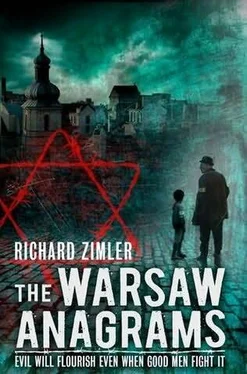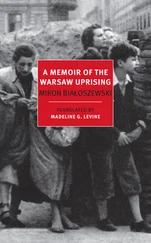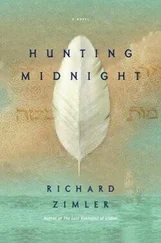We stared at each other for a long time, and because of what I now knew was possible between us, our solidarity terrified me. I don’t know what she saw, but I saw a girl crawling through the trenches of a long slow war, and whom I was powerless to protect – and whom I resented because of that.
I handed her ten złoty, which made her rise up on her toes and give me a popping kiss on the cheek – transformed into a young girl again.
‘Now go,’ I told her. ‘Your mother must be worried.’
As soon as Bina left, I headed to the bakery in our courtyard. Coming in from the arctic chill, the heat seemed tropical, and the workers were in their bare feet and shirtsleeves, with paper bags on their heads. Ewa wasn’t there – she was at home with her daughter – so Ziv agreed to look after Stefa.
In the hour I had before Mikael Tengmann’s arrival, I intended to search for more border crossings, but when I reached the sidewalk I heard my name called from behind me. Turning, I saw the fox-faced woman I’d spotted at the funeral, still carrying her book. Her ears and nose were red.
‘Dr Cohen, excuse me for interrupting, but I need to speak with you,’ she said.
Looking at her closely, I realized I’d seen her prior to the funeral, but I couldn’t remember where. ‘Why didn’t you knock on our door?’ I asked.
‘I didn’t want to impinge on your grief.’
‘You must be frozen. Let’s go upstairs.’
‘No, your niece may react badly to what I have to say. Where else can we talk?’
‘The Café Levone. We’ll get you something warm to drink.’
As we started off, she said, ‘I felt I had to be at the funeral. I’m sorry if I seemed out of place. I didn’t know your grandnephew.’
‘There’s no need to apologize,’ I replied.
She looked at me gratefully. ‘My name is Dorota Levine.’
When I asked what she was reading, she turned the cover of Stefan Zweig’s Marie Antoinette to face me. ‘I take a book with me whenever I know I’m going to wait.’
It was then that I recalled that she’d come to the Yiddish Library a few weeks earlier and asked me to help her find books on butterflies for her son.
‘I think we met briefly a couple of weeks ago,’ I told her. ‘At the library where I work.’
She smiled. ‘You were very kind to help me.’
She grew silent then, and she rubbed her hand over her lips as if to keep from making further revelations. My curiosity about her made me fail to spot a puddle in time and I stepped through its ice sheet into the mud below. Sopping, cursing under my breath, I trudged on. Once seated inside the café, I kicked off my shoes, which were as ugly as two dead bats. My toes had been stained brown by my wet socks and my nails were yellowing daggers. A waiter fetched me a towel and then produced a dry pair of socks, insisting I take them, which was so unexpected that I was struck dumb.
The café smelled of cheap beer and cigar smoke. While we waited for our coffee, Dorota told me her cousin Ruti was married to the son of a university acquaintance of mine. The young man’s name was Manfred Tuwim, and although he was stuck in Munich, far away from lonely Ruti… Dorota launched into one of those wordy explanations that Jews cobble together to prove that they’re all part of the same club, linked through enough upstanding friends and relatives – and maybe even a rabbi or two – to fill up a bar mitzvah reception at the Berlin Sports Palace. My father had called this tiresome tradition Jewish knitting .
I cut her off. ‘Why did you want to talk with me?’ I asked.
She took a black-and-white photograph from the pages of Marie Antoinette . ‘Because of my daughter, Anna,’ she replied, handing it to me.
A slender girl stood by a fruit tree turned by springtime into a cloud of white blossoms. She wore a pleated skirt – dowdy and old-fashioned – and a dark, high-collared blouse that looked as if it reeked of mothballs. Their antiquity seemed to embarrass Anna, and she’d pulled her long tresses around to her front and was holding on to them for dear life. It was a pose that troubled me; children who cling to themselves generally have no one they can trust.
Putting on my reading glasses, I spotted fierce resentment in Anna’s eyes, and saw, too, that she was leaning towards the right edge of the picture, anxious to flee. But the photographer’s finger had clicked the shutter too quickly, sending her image into the future – and here to me. Beside the girl was a figure that had been cut away except for the small hand that held hers. I guessed that the missing person had been her brother, and that he had been the anchor keeping Anna from dashing away.
‘That was a year ago,’ Dorota told me. ‘My husband took the picture in Bednarski Park – in Kraków. We were visiting my in-laws.’
I’ve learned from my patients to pay close attention to the first offering they give you. Keeping the photograph with her was clearly Dorota’s way of proving to me that she’d never leave home without a reminder of her daughter – and that she was devoted to the girl. Yet why had she chosen such an unflattering shot?
‘Anna didn’t like being photographed,’ I observed.
‘No, she hated it – at least when my husband took the pictures.’
Dorota seemed keen to convince me that mistrust characterized the relationship between Anna and her father. ‘Her clothes were an older sister’s?’ I asked.
‘No, but the blouse had been mine.’
‘Who was with her – holding her hand?’
‘Her brother, Daniel. He was seven then.’
Our coffee had just arrived, and I was eager for the clarity of thought it would give me, but it was as bitter as acorns. Dorota was gazing away from me, and fidgeting with her collar. She seemed a woman who knew she was passing through life largely unseen. Under normal circumstances I’d have said she was leading a smaller life than was necessary, but inside our enclave, being overlooked could prove an advantage.
‘Does Anna get along well with Daniel?’ I asked, catching the waiter’s eye and motioning for him to return.
‘They used to fight like devils when they were little,’ Dorota told me, ‘but they’d become friendlier of late.’ She gazed down, as though she’d already said too much.
Her retreat into silence – and use of they’d instead of they’ve – made me wonder if one or both of her children had died, though with any luck they’d merely been smuggled to Christian friends outside the ghetto.
The waiter came to me, and I asked for a shot of schnapps. As he left, a pigeon flew in the door. Landing on an empty table, he began pecking at crumbs.
I faced Dorota again. ‘So your son is a fan of butterflies,’ I told her, testing whether she’d use the present tense when discussing him.
‘Yes, he thinks they’re the most wondrous creatures in the world,’ she replied, beaming as if I’d made her day.
So it was her daughter who resided inside the past. I handed her back the photograph. ‘What’s happened to Anna?’ I asked.
Dorota looked around the café to confirm that no one was eavesdropping, then shifted her chair towards mine. ‘She’s dead,’ she confided. ‘The Nazis murdered her. She was tossed into barbed wire. Just like your nephew.’
Stunned, I raised my hand over my eyes as though to protect myself. ‘I’m very sorry to hear that,’ I told her. ‘When did this happen?’
‘A little over three weeks ago.’
‘And you came to the funeral because you think there’s a connection between Adam and her – from the way they were found.’
‘Not just that. When she was brought to me, her right hand was missing.’
Читать дальше












